Evaluation at Educare
Educare
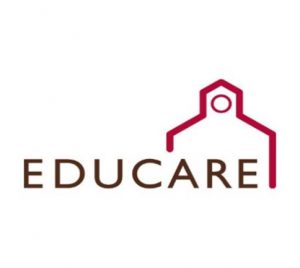
Educare is a model of comprehensive, center-based early childhood education serving under-resourced communities. At the heart of the model is the belief that access to high-quality early education in neighborhoods where families live seeds opportunities for success in community, school, and life. Since 2000, 25 Educare schools have opened across the U.S. Together with leading advocates for increasing opportunities for children and families in under-resourced communities, these schools make up the Educare Learning Network.
Educare offers full-day, year-round education for children 6 months to five years old, engaging families as their children’s primary champions. Schools share four domains of practice: data utilization; embedded professional development; high-quality teaching practices; and intensive family engagement. Emphasis on data use distinguishes Educare schools, making it feasible to conduct longitudinal research across schools (Educare National Research) and continuous program evaluation within each school.
Educare Seattle
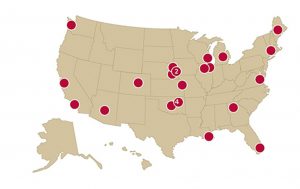
Part of a State-wide early learning initiative, Educare Seattle partnered with Puget Sound Educational Service District to make tangible a shared vision: Success for each child and family, eliminating the opportunity gap by leading with racial equity.
In addition to providing direct service, Educare Seattle was built to inspire and lift up early learning as a path to equity in our region. Consequently, Educare Seattle was designed to be a resource for parent leadership and advocacy, a training hub for early learning professionals, and a demonstration site for early learning practice and innovation in the Pacific Northwest.
Educare Seattle offers early learning services to 138 children and families in White Center, a vibrant and racially, culturally, and economically diverse community. Diversity characterizes Educare Seattle’s staff of early learning professionals as well. Their engagement in national research and continuous improvement has been guided, since 2009, by researchers at University of Washington’s Barnard Center for Infant and Early Childhood Mental Health.
Educare Implementation Study
Educare schools participate in a national study tracking child and family outcomes and program implementation over time. National evaluators at Frank Porter Graham Child Development Institute (FPG, University of North Carolina at Chapel Hill) coordinate the cross-site study and shared research agenda. The national and local evaluators collaborate in decision-making and dissemination of findings.
At each school, local evaluators use a shared timeline and collect a common set of measures, including direct child assessments, classroom observations, staff surveys, and parent interviews and surveys.
The Educare Implementation Study documents at school and aggregate levels:
• progress over time of Educare’s children and families
• experience of Educare’s early learning professionals
• school and Network development towards fully implementing core features
The majority of Educare children leave for kindergarten with social-emotional and academic skills to succeed. Children enrolled earlier, and for longer periods of time, demonstrate better outcomes (Yazejian et al, 2015). More information about results can be found at the FPG National Evaluation website and Educare Schools’ results.
Ongoing, large-sample research across early learning sites is a valuable, unique resource that
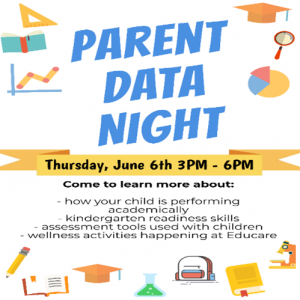 • informs national practice and policy. During COVID-19, Educare network and data advanced quick learning and sharing of information within and beyond Educare schools. Together, they mobilized new supports for children and families, and informed quickly evolving practice and policy in the field.
• informs national practice and policy. During COVID-19, Educare network and data advanced quick learning and sharing of information within and beyond Educare schools. Together, they mobilized new supports for children and families, and informed quickly evolving practice and policy in the field.
• it prepares parents as their child’s best advocate in life and systems. Parents see, use, and talk about data in child conferences, “data events,” and hallway dialogues. Together with teachers and family advocates, they interpret and inquire. Data become familiar and their tool set for current and future advocacy.
Ongoing Program Evaluation
A research-program partnership (RPP) between a local evaluator and Educare staff supports a culture of inquiry and regular use and sharing of data to advance learning, planning, and program impact. A research-program partnership helps sustain use of data to inform practice and goals over time.
Local evaluators from the UW’s Barnard Center participate in Educare Seattle school routines, family events, and trainings. They also guide embedded routines and services to support data utilization, including:
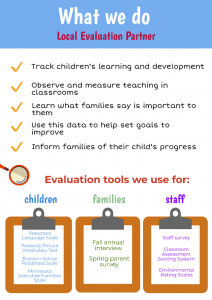 • Monthly RPP meetings for data dialogue and review
• Monthly RPP meetings for data dialogue and review
• Easy-access data dashboards with current and longitudinal information about children’s progress
• Participation and hosting of school events, like open houses, “hallway happenings,” and “Family data night”
• Data displays to stimulate questions and dialogue
• Support for teacher understanding and use of standardized classroom observation tools and technology
• Informative child progress reports for family conferences and children leaving for kindergarten
• Review of questions, measures, methods, and communications using an equity lens
• Engagements of staff and families in field studies and innovation grants, to test new ideas, practices, and measures
Information about Educare research and evaluation partnership is shared with families when they enroll in Educare and consent to participate in studies directed by University of Washington researchers from the Barnard Center. Following are examples of local materials used to stimulate questions and data dialogues among Educare Seattle families, staff, visitors, and stakeholders.
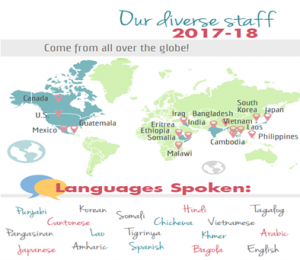
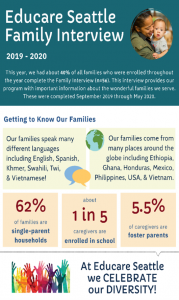
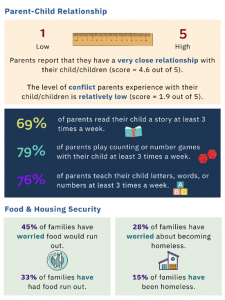
Innovation
The Educare Network is a hub for innovation in early childhood research and practice. Schools and research partners brainstorm and collaborate to propose and test new ideas, accelerate progress, individualize efforts for local needs, and advance the field at large. This process promotes connection and synergy across and beyond the Network.
Seattle Educare parents, teachers, family advocates, administrators, and researchers have participated in the following 3 innovation grants:
Mindfulness and Mastery: Supporting Social Emotional Skills and Executive Functioning in Children, Teachers, and Families
Educare Seattle is in the third year of an innovation grant to support and test mindfulness practices that increase social-emotional skills and executive functions of children, staff, and families in Educare. This work is funded by an innovation grant from the Buffett Early Childhood Fund and coordinated by evaluators from Educare Lincoln and the University of Nebraska Medical Center.
Together with 12 other Educare schools, we launched initiatives to address needs of children, staff, parents, and administrators. In partnership with the UW Center for Child and Family Well-Being, Educare Seattle provided programming to support resilience of parents and educators. Collectively, all sites measure process and impact, sharing training and learning among and beyond Educare schools.
The grant has funded implementation of the following activities at Seattle Educare:
- School-wide training in Conscious Discipline a trauma-informed curriculum advancing language and practices to support social-emotional learning
- Training 2 teacher cohorts in Brain Games, a program to increase self-regulation skills in preschoolers, toddlers, and infants
- Implementation of activities from Second Step (Brain Builder Games) and Creative Curriculum (Mighty Minutes) to promote self-regulation in PreK and toddler classrooms
- Teacher implementation of relaxation exercises and yoga in the classroom
- Implementation of REAL Pro, a program to reduce stress and increase resilience and knowledge of trauma-informed practice among early learning staff
- Administrators received 3-session REAL Pro training in school-wide support for mindfulness initiatives
- Parenting groups on resilience delivered to 3 cohorts at Seattle Educare
Findings to date:
- Teacher outcomes showed reduced levels of emotional exhaustion related to job stress from year 1 to year 2, and increased feelings of personal accomplishment.
- Cross-site level data showed increased mean child executive function (EF) scores from fall to spring, 2018-19.
- Child EF scores in fall, 2019-20 showed that more Seattle Educare children met age expectations following EF classroom practices than in the previous year.
Parent Ambassadors in the Educare Learning Network
Parent Ambassadors, a grassroots advocacy program for low-income parents, is grounded in an empowerment model of peer-to-peer education in effective advocacy for change. Over 12 months, parent ambassadors engage in training in communications, leadership, legislative advocacy, and grassroots organizing. They advocate at state and federal levels, training other parents in their programs.
Since 2009, Washington State Association (WSA) parent ambassadors advocated for increased investments in children and families via Head Start and other programs. Testimony and work of parent ambassadors at PSESD and Seattle Educare helped pass ground-breaking legislation and child-friendly budgets. Word spread.
Building on their success, Educare Seattle used an innovation grant from Buffett Early Childhood Fund to co-develop a program for parent ambassadors at Educare Maine.
These efforts galvanized a subsequent 3-year innovation grant to continue building State-wide parent leadership and advocacy programs in Educare schools in Colorado, Florida, and Illinois. To accelerate the work, Educare Central Maine joined WSA Parent Ambassadors to develop a scale-up guide and a parent ambassador alumni program.
Parents and parent support staff across Educare schools continue to collaborate to seed an increasingly effective, diverse, and vibrant parent leadership and advocacy network for change, within and beyond Educare schools.
Early Science Initiative
Young children benefit from scientific inquiry as a pathway to satisfy natural curiosity and motivation to explore and understand the world. The Early Childhood Science Inquiry Project, developed by Dr. Darryl Greenfield at Educare Miami and the University of Miami, seeks to expand this pathway in both schools and homes, measuring the impact on learning of young children and the pedagogy and practice of early learning professionals and programs, especially in low-income schools and communities.
In 2017, Educare schools in Miami, Seattle, and Omaha piloted classroom practices focused on science instruction and job-embedded professional development. Funded by an acceleration grant from Buffet Early Childhood Fund, the pilot aimed to increase knowledge of science pedagogy among early childhood educators and evaluate impact on classroom practice and learning. Educare schools piloted a computer-based adaptive test of science concepts and methods used with PreK children.
Mentor teachers, followed by preschool, toddler, and infant teachers, implemented activities using science as a platform for deep inquiry, reflection, and collaboration about teaching and learning. Other Educare schools joined later phases of the grant, which engaged families with science activities as a platform for home-school connections and enhanced learning. More information about the early science initiative can be found at https://www.earlyscienceinitiative.org/
Activities
- Seattle Educare mentor teachers participated in training to expand pedagogy and science activities in PreK, then toddler and infant classrooms
- Seattle Educare teachers in PreK and toddler classrooms co-constructed science lesson plans to implement, then share across Educare pilot schools
- Seattle Educare classroom teachers participated in multi-site trainings on science learning and teaching in the early years
- Seattle evaluators piloted use Lens on Science, an Item Response Theory (IRT)-based, computer adaptive test of science concepts and methods for PreK children